
Sedation Dentistry – New Haven, CT
Relax in the Dentist’s Chair

We understand that many patients are nervous about their treatment. Others have a physical condition that makes it difficult for them to remain still during their appointments. To help such individuals, we offer three types of sedation dentistry: oral conscious sedation, nitrous oxide sedation, and general anesthesia. Keep reading to learn more about how we can use these methods to enhance your experience at New Haven Dental Group.
Why Choose New Haven Dental Group for Sedation Dentistry?
- Multiple sedation types
- Experienced, highly trained sedation experts
- A safe way to cope with dental anxiety
What Is Sedation Dentistry?

Sedation dentistry is a term that refers to any of a number of methods that are used to sedate patients during dental treatment. Sedation techniques involve administering certain types of medications that produce a calm, relaxed sensation. Sedation is suitable for most patients who:
- Are anxious about their treatment
- Have a strong gag reflex
- Find it difficult to sit still
- Need to undergo an extensive or complex procedure
- Must undergo multiple procedures at once
Types of Sedation
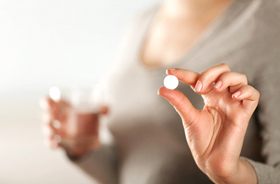
The three types of sedation available at New Haven Dental Group are:
- Oral conscious sedation. You take a pill shortly before your appointment. The medication will help you feel relaxed. You will remain alert enough to answer questions or respond to directions. Because the medication used is so powerful, you will not be able to drive yourself home after your appointment.
- Nitrous oxide sedation. You inhale a colorless gas through a nasal mask. The gas instantly produces a relaxed feeling. We can adjust your level of sedation throughout your procedure. Nitrous oxide wears off very quickly, which means it will be safe for you to drive yourself home.
- General anesthesia. This is the most powerful type of sedation; we only recommend it in rare cases. It produces unconsciousness and requires supervision from a specially trained expert.
Oral Conscious Sedation
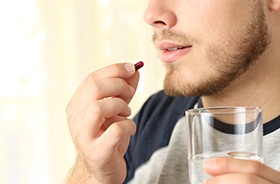
Oral conscious sedation is a simple but powerful relaxation technique. All you have to do is swallow a pill shortly before your procedure is scheduled to begin. Within minutes, you should start to feel relaxed and calm. You can expect your treatment to be a breeze. Afterward, you may remain groggy for several hours, so you should have a trusted adult available to drive you to and from our office.
What Is Oral Conscious Sedation?
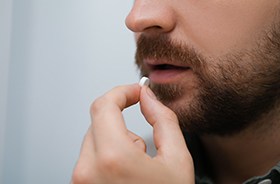
Oral conscious sedation does not involve any masks or needles. You simply swallow a prescription sedative before your treatment. The medication used can vary, but it may be Valium, Ativan, or Halcion. It should kick in within 15 minutes or so, and you will stay relaxed and calm throughout your treatment. You may also become drowsy, but you should remain alert enough to respond to questions and directions from our team. If you fall asleep, it should be easy for our team to awaken you.
How Does Oral Conscious Sedation Work?

Here are some notes about what to expect while you are under the influence of oral conscious sedation:
- We will monitor you closely throughout your procedure to care for your safety.
- Oral conscious sedation is powerful, and its effects may linger for several hours after your appointment. You should not drive or do any other potentially dangerous tasks during that time.
- You might not remember your procedure after the sedation wears off. Many patients like this because the sights and sounds of dental care make them uncomfortable.
Are You a Good Candidate for Oral Conscious Sedation?
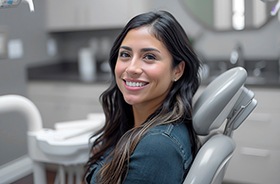
Oral conscious sedation might be suitable for you if:
- You suffer from a degree of dental anxiety or fear.
- You have a very strong gag reflex.
- You sometimes cancel or delay dental appointments out of fear of what you will experience.
- It is difficult for you to sit still for long periods of time.
- You have had bad dental care experiences in the past.
- You do not have any contraindications for oral conscious sedation. For example, you should not be pregnant or have certain respiratory conditions.
Nitrous Oxide Sedation
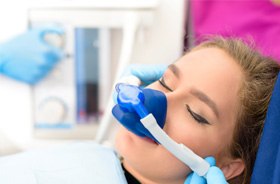
Nitrous oxide is the mildest form of sedation that we offer. All you have to do is inhale through a special nasal mask, and you will start to feel relaxed! We often use this form of sedation for patients with mild dental anxiety, as well as those who are not easily numbed by local anesthesia. It is safe for most people, including children! Due to its relatively simple nature, it is also one of the more affordable forms of sedation.
Who Is a Good Candidate for Nitrous Oxide?
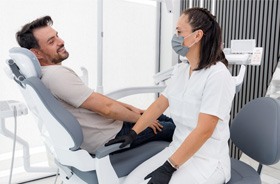
Nitrous oxide is safe and suitable for a wide range of patients. It might be a good fit for you if:
- You struggle with mild to moderate dental anxiety.
- You are not easily numbed by local anesthesia.
- You find it difficult to sit still for long periods.
- You need to undergo a complex procedure.
- You have a strong gag reflex.
Nitrous oxide can be used on patients of virtually all ages. However, it might not be right for patients who are pregnant, as well as those who have certain allergies or respiratory conditions. Our dental team can consult with you to figure out the best way to help you enjoy a comfortable care experience.
How Does Nitrous Oxide Work?
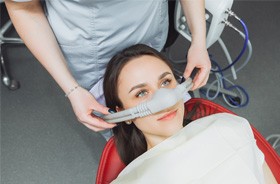
Nitrous oxide does not involve the use of any needles or pills. We simply place a small mask on your nose. Through it, you inhale a mixture of nitrous oxide and oxygen. Within moments, you should start to feel relaxed. You might also experience a giddy or floating sensation. We can adjust your level of sedation throughout your procedure to keep you comfortable. Once we finish your treatment, the nasal mask will be removed, and within minutes, you should feel completely alert. It should even be safe for you to drive yourself home.
Aftercare for Nitrous Oxide

Even though the effects of nitrous oxide wear off quite quickly, we will still ask you to stay in our office for a few minutes so we can monitor you as the sedative leaves your system. Some patients experience mild nausea or a headache following exposure to nitrous oxide, but such effects usually go away in a short time.
Nitrous oxide will not stop you from resuming your normal activities, but if you need invasive dental treatment, you might need to go home and rest as part of your recovery. Be sure to follow our team’s instructions so you can minimize your risk of post-op complications.
Benefits of Sedation Dentistry

Benefits of sedation dentistry include:
- It can enable even the most fearful patients to enter their appointment with confidence.
- It is safe for the vast majority of individuals; side effects are usually quite mild.
- Different types of sedation mean there is one to fit practically every budget and circumstance.
- No matter what type of service you are visiting us for, we may be able to sedate you. Some patients even request sedation for a simple cleaning. Remember, our goal is to make you comfortable!
Cost of Sedation Dentistry
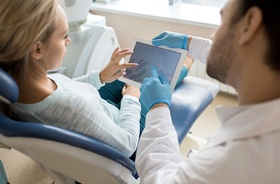
The cost of sedation will depend on which method we use. Nitrous oxide tends to come with the lowest price, while general anesthesia is more expensive. Dental insurance usually does not cover sedation unless it is determined to be a medically necessary part of a procedure; for example, it is standard practice to use sedation as part of some types of oral surgery. Our team will give you an estimate for the cost of your sedation, and we can help you apply to finance your entire procedure, including the sedation, with CareCredit if necessary.
Would you like to learn more about sedation dentistry and how it may benefit you? Get in touch with one of our dental offices today.
Sedation Dentistry FAQs
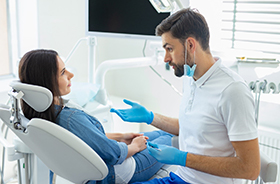
Are you interested in being sedated for your next dental procedure? You may find the idea appealing, but you likely still have questions about what you can expect with sedation dentistry. That is why we have compiled the following list of frequently asked questions, along with their answers. If you do not see the information you were looking for, you are welcome to contact our team directly so we can personally satisfy your curiosity.
Does Oral Sedation Put You to Sleep?
You might drift off to sleep while you are under oral sedation. However, the medication will not make you unconscious. It will be easy for us to awaken you with a gentle shake, and you will retain enough alertness to be able to answer our questions or respond to our directions. The only form of sedation that is designed to produce unconsciousness is general anesthesia.
How Long Does It Take for Oral Sedation to Kick In?
How fast oral sedation works will depend on the specific medication used, as well as your individual metabolism. Most people start to feel its effects within 30 – 60 minutes. We will not rush the beginning of your treatment; we will make sure you are relaxed before we begin your procedure. Other types of sedation, such as nitrous oxide and general anesthesia, begin to take effect almost immediately.
Can I Drive After Oral Sedation?
The medications used in oral conscious sedation are quite potent. The pill you take will slow down your reaction times and make you feel drowsy, and its effects may linger for around 24 hours. Hence, it will not be safe for you to drive after your appointment. You should have a friend or family member ready to take you home and run any necessary errands for you until the sedation wears off completely.
It will also be unsafe for you to drive after being under general anesthesia. However, if you are sedated with nitrous oxide, you may be able to drive yourself home.
Will I Be Able to Feel Pain with Nitrous Oxide?
Nitrous oxide has three main effects: It calms anxiety, it produces a feeling of euphoria or giddiness, and it kills pain. To ensure your comfort during procedures, we typically use local anesthetic along with nitrous oxide so you will feel little to nothing while we work to care for your teeth and gums.
How Long Does It Take to Recover from General Anesthesia?
After your procedure, you will be given some time to wake up from the general anesthesia and regain awareness. Usually, this takes 45 – 60 minutes. Some grogginess or other side effects may linger longer than that. Also, keep in mind that even though you may feel alert after a relatively short period of time, your reflexes may still be slowed. That is why you should not drive, operate heavy machinery, or even cook during the first 24 – 48 hours after you come home from your appointment.